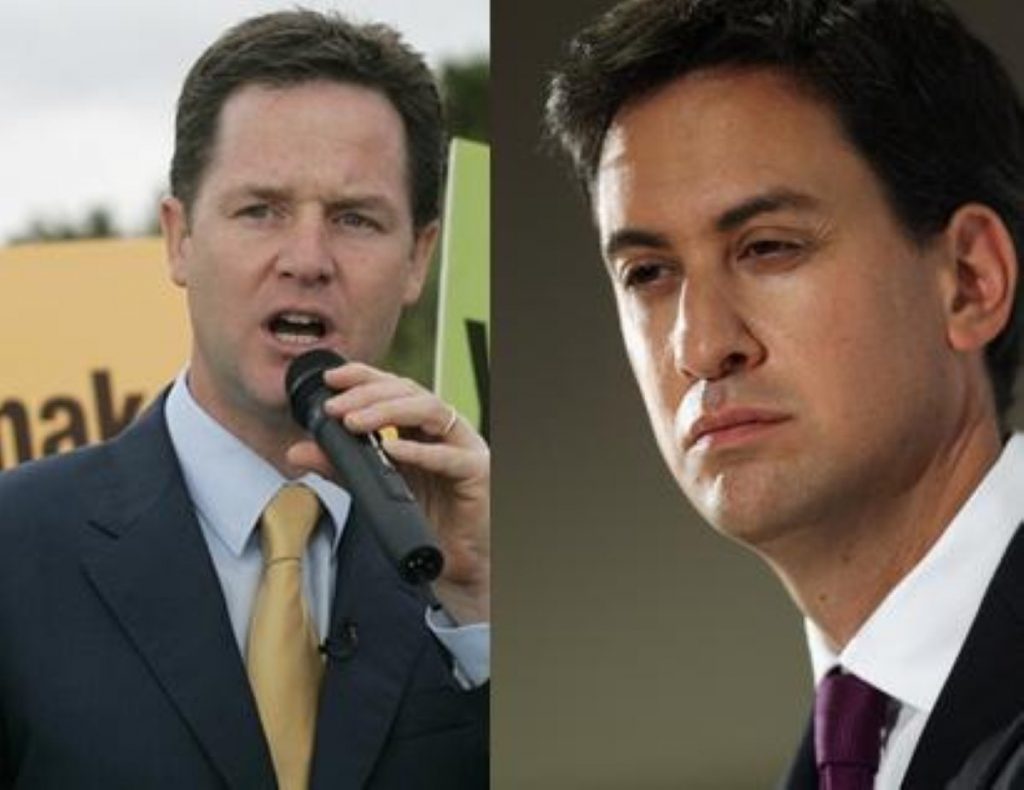Miliband and Clegg turn down pay rise – but will Cameron?
David Cameron was coming under increasing pressure to rule out taking a pay rise today, after plans for a major 11% salary boost for MPs were unveiled.
MPs are set to earn a basic salary of around £75,000 after the Independent Parliamentary Standards Authority (Ipsa) announced an increase in their earnings, together with reforms to the expenses and pension system.
Nick Clegg and Ed Miliband have already ruled out taking the pay rise, but the prime minister's spokesman would not be drawn on whether Cameron would join them.
"I'm very clear – I don't think this package of proposals should go ahead in the current economic circumstances," Miliband said.


"If this was to go ahead I wouldn't be accepting this pay rise but I don't think it is going to go ahead in the current circumstances, because I think that when Ipsa consult the public, the public will be pretty clear that while the difficulties we have in the economy persist we can't have MPs getting a 10% pay rise."
The proposals managed to unite disparate political figures, from leading trade unionists to the Taxpayers' Alliance and government ministers.
Education secretary Michael Gove branded Ipsa a "silly organisation" and added: "As far as I'm concerned about this pay rise they can stick it."
Labour MP Tom Harris tweeted: "If we abolish Ipsa, I will gladly vote to limit MPs' pay to a 1% rise. But will our party leaders offer us that option?"
Matthew Sinclair, chief executive of the TaxPayers' Alliance, said: "The idea of hiking MPs' pay when everyone else has been suffering such a squeeze on their earnings is totally unpalatable.
"MPs do an important job and work hard, but they already earn nearly three times the national average and more than most of their European counterparts."
Paul Kenny, general secretary of the GMB union, commented: "The principle of MPs getting a decent salary is not an issue. MPs should be paid properly for what is an important job and they should only have one job.
"In the current circumstances, where these same MPs are responsible for policies which have led to pay freezes and a fall in living standards, an 11% rise would be a kick in the teeth for the millions of workers who are the victims of their policies."
Ipsa boss Ian Kennedy, who earns £700 a day but only works an average of two days a week, said there was never a good time to raise MPs' pay.
"The history of MPs' pay and pensions is a catalogue of fixes, fudges and failures to act," he said.
"The package we put forward today represents the end of the era of MPs' remuneration being settled by MPs themselves.
"For the first time, an independent body will decide what MPs should receive. We will do so in full view, and after consultation with the public."
The pay rise will be balanced by a crackdown on perks such as a £15 dinner allowance when the Commons sits after 19:30.
There are also likely to be tighter rules on the use of taxis and claims on second homes, including home content insurance.
'Golden goodbyes' of up to £65,000 are also set to be scrapped and the pensions system reformed to bring it in line with the public sector.
But those moves will do little to alleviate public anger over the rise, which is well above the one per cent pay rise being received by public sector workers.
The package of proposals is expected to have a price tag of £500,000 a year.
Ipsa is tasked with independently setting MPs' pay and was specifically set-up to do so without a vote in the Commons.
Even if party leaders, who all oppose the move, tried to scrap Ipsa, it would involve a vote of parliament, which MPs would be unlikely to support given most believe they are underpaid.
From after the next election, MPs pay will rise in line with average earnings, meaning this should be the last time the debate on MPs pay is quite so vitriolic.









